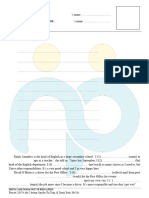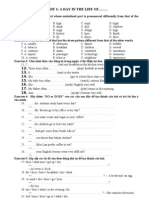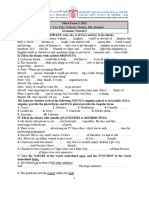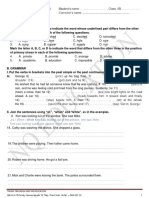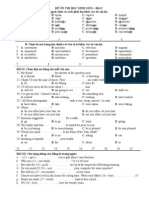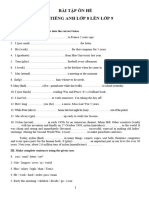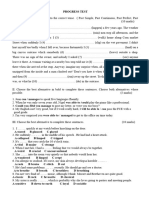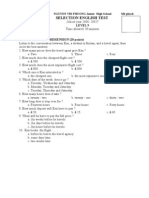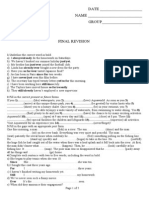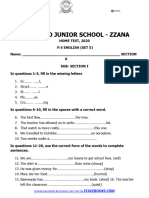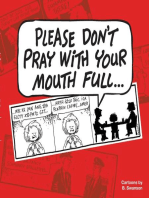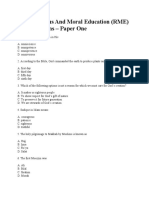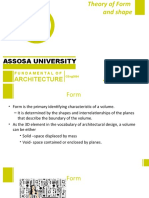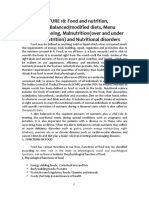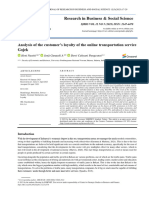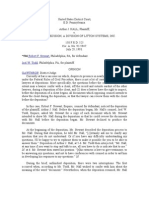Locking To Have Talking Being To Open To Take Sky-Diving Starting
Locking To Have Talking Being To Open To Take Sky-Diving Starting
Uploaded by
Gia AN LêCopyright:
Available Formats
Locking To Have Talking Being To Open To Take Sky-Diving Starting
Locking To Have Talking Being To Open To Take Sky-Diving Starting
Uploaded by
Gia AN LêOriginal Title
Copyright
Available Formats
Share this document
Did you find this document useful?
Is this content inappropriate?
Copyright:
Available Formats
Locking To Have Talking Being To Open To Take Sky-Diving Starting
Locking To Have Talking Being To Open To Take Sky-Diving Starting
Uploaded by
Gia AN LêCopyright:
Available Formats
Q1 - LESSON 9 Student’s name:......................................Class: 8B................
Corrector’s name:......................................
LISTENING
Questions 11 – 17. Complete the notes below. Write NO MORE THAN THREE WORDS AND / OR A
NUMBER for each answer.
RUN-WELL CHARITY
Background to Run-Well charity
Set up in (11) ..............................................................................................................................
Aim: raise money for the (12) .....................................................................................................
Race details
Teams to supply own (13) ..........................................................................................................
Teams should (14) ........................................................................................................together
Important to bring enough (15) ...................................................................................................
Race will finish in the (16) ...........................................................................................................
Prizes given by the (17) ..............................................................................................................
Questions 18 – 20. Choose THREE letters A-H. Which THREE ways of raising money for the charity are
recommended?
A. badges F. picnic
18. ……………………… B. bread and cake stall G. postcards
19. ……………………… C. swimming event H. quiz
20. ……………………… D. concert I. second-hand sale
E. door-to-door collecting
A. GRAMMAR
I. Underline the correct word or phrase in each sentence.
1. Tom suddenly realized he’d forgotten to lock / locking his door.
2. On the way back we stopped to have / having some tea.
3. Could you stop to talk / talking, please.
4. Learning a language means to be / being interested in another culture.
5. Ann tried to open / opening the window, but it was too high to reach.
6. Please remember to take / taking the dog for a walk.
7. Cathy says she’ll never forget to sky-dive / sky-diving for the first time.
8. I don’t really remember to start / starting school when I was five.
II. Underline the correct verb in each sentence.
9. Helen enjoyed / chose to learn French.
10. I really can’t stand / afford to travel by plane.
11. Do you mind / want coming back in half an hour?
12. Tina suggested / meant to buy some potatoes, but she forgot.
13. Emily denied / refused opening the office safe.
14. Bill admitted / agreed making a serious mistake.
15. My parents disliked / decided to send me to a different school.
16. I really like / fancy a trip to the country.
TRUNG TÂM NGOẠI NGỮ NQ EDUCATION
25N7A & 27N7A dãy 2 đường Nguyễn Thị Thập, Thanh Xuân, Hà Nội – 0961 779 366 1
III. Complete the second sentence so that it is as similar in meaning as possible to the first sentence,
using the word given. Do not change this word.
17. I’m sorry but we have decided not to accept your application. regret
I regret to inform you that we have decided to reject your application.
18. Funnily enough I’d prefer a pizza for a change. rather
Funnily enough I’d rather a pizza for a change.
19. We were not allowed to drink too much Coke when we were children. let
Our parents didn’t let us to drink too much Coke when we were children.
20. I think it would be a good idea to take the train. suggest
I suggest taking the train.
21. She succeeded in persuading her parents to let her go. managed
She managed to persude her parents to let her go.
22. It looks as if this door’s locked after all. appears
This door appears to be locked after all.
23. One of the things I hate is people eating popcorn in the cinema. stand
One of the things I can’t stand is people eating popcorn in the cinema.
24. The singer arrived two hours late but I’m glad I waited for him. worth
The singer worth waiting .
25. Jack said he had to catch the early flight. insisted
Jack insisted on catching the early flight.
26. I can’t wait to get your next letter. forward
I’m looking forward to getting your next letter.
III. Complete each sentence with a form of one of the verbs from the box. Use each verb one only.
afford bear continue expect happen
learn love offer prefer pretend
27. John really ……………loves………………………. spending all day at the beach.
28. I’m completely broke, so I can’t ………afford……………………………. to go on holiday.
29. Excuse me, but do you…………happen…………………………. to know the way to Old Street?
30. We ……………expected………………………. our team to win, but they were badly beaten.
31. Carolyn …………learned…………………………. to speak French and German when she was at school.
32. Even when the examiner told him to stop, Robert …………continued…………………………. speaking.
33. I’m sorry, but I can’t ……bear………………………………. to listen to this awful music!
34. Last week Chris ………offered……………………………. to help me paint my bike.
35. Paul ………………pretended……………………. to have a bad leg so he didn’t have to go to the gym.
36. Sam usually ……………prefers………………………. playing football to doing homework.
IV. Complete each sentence with one of the words from the box.
agreed asked chose decided hate
hopes like refused seems want
37. Greg often …………seems………………………………. to be worried.
38. I ……………hate……………………………. to tell you this, but we’ve lost all our money.
39. Do you ………want…………………………………. to go for a walk this afternoon?
40. I ………………asked…………………………. Ann to wait for me, but she didn’t.
41. Katrina ………………hopes…………………………. to become a champion skater.
42. The police officer ………refused…………………………………. to listen to my explanation.
43. Peter ……… chose…………………………………. to work on Saturday instead of on Friday.
44. I’d ……………like……………………………. to see you again some time.
TRUNG TÂM NGOẠI NGỮ NQ EDUCATION
25N7A & 27N7A dãy 2 đường Nguyễn Thị Thập, Thanh Xuân, Hà Nội – 0961 779 366 2
45. After a lot of thought, Jim finally ………………decided…………………………. to spend his holiday in
Peru.
46. I asked my teacher for help, and she ……………agreed……………………………. to give me extra
lessons.
B. VOCABULARY
I. Use the words in the box to describe the people below.
absent-minded bossy generous impulsive indecisive
laid-back punctual reliable shy witty
47. Andrew can never make up his mind about anything. Just don’t offer him a choice! indecisive.
48. Carlos is not rich, but he always buys us drinks. generous
49. Claudia has never been late for a class - not once in seven months! punctual
50. I can’t believe that guy Klaus. One day he just walked out of the class and went to Peru. …
impulsive………………
51. Jana doesn’t seem to worry about anything. I wish I was more like her! …laid-back…………………….
52. Millie tries to dominate the class. She really pushes everyone around. ………bossy……………….
53. Poor Sandra! Recently she left her laptop computer at a bus stop. ……absent-minded………………….
54. Ruth is very sweet, but she never speaks unless you speak to her first. ……shy………………….
55. When the teacher asks questions, Naseem always has a funny answer. ………witty……………….
56. You can always depend on Ashok. ……reliable……………….
II. Replace the words in bold type in the following sentences with a single word from the box.
Insomnia chứng hitchhiking atmosphere nephew outskirts
mất ngủ
optimistic surgeon regretted exhausted Stamina
souvenir apologized emergency biography shelter
57. He was a happy person who was always expecting the best to happen (………
optimistic………………...).
58. He was very sorry for (………regretted………………...) what had happened. He felt that it was his
fault.
59. He had great resistance to tiredness (………stamina………………...) and could run for hours without
stopping.
60. I sometimes read in the middle of the night, as I suffer from a serious inability to sleep (……………
insomnia…………...)
61. I’ve just read a very good account of the life (……biography…………………...) of Fidel Castro.
62. The manager of the hotel said she was sorry (……apologized…………………...) for all the problems
we had experienced. And she offered a discount!
63. Since the age of about nine, I’ve always wanted to be a person who performs operations at a
hospital (…………surgeon……………...)
64. It was a terrible storm and on the bare mountainside there was nowhere to get out of the bad weather
(……………shelter…………...)
65. By the way, this is my brother's son (………nephew………………...), Roger.
66. I was totally tired and worn out (…………exhausted……………...) after running the London Marathon.
67. Too much carbon dioxide is now entering the layer of air and gases surrounding the Earth (…………
atmosphere……………...)
68. I tried standing by the road with my thumb in the air (…………hitchhiking……………...), but nobody
stopped - so I took the bus.
69. Quick! Call an ambulance. This is an extremely dangerous situation in which we must act fast
(…………emergency……………...)
TRUNG TÂM NGOẠI NGỮ NQ EDUCATION
25N7A & 27N7A dãy 2 đường Nguyễn Thị Thập, Thanh Xuân, Hà Nội – 0961 779 366 3
70. We met in a cheap hotel, somewhere in the area of housing a long way from the centre (…………
outskirts……………...)
71. The shop next to the Tower of London sells cheap things to remind you of your visit (…………
souvenir……………...) - well, they look cheap, but actually they’re quite expensive!
READING
You are going to read a review of a TV program about homes of the future. Choose the answer A, B, C
or D which you think fits best according to the text.
THE HOMES OF THE FUTURE VIEWED FROM TODAY
Mark Finchley reviews TV series Tomorrow’s Homes
Having just watched the whole of Channel 8’s TV series Tomorrow’s Homes, I’ve been wondering about
how anyone can predict the future of domestic life. You’d imagine that if you knew what architects and
technology companies were developing now to make life easier, more exciting and more beautiful, you’d have a
pretty good idea of what to expect in tomorrow’s homes. In reality, it’s more complicated, and just as much
about what we’ll choose to hang on to from today’s - the things that are ‘future-proof’. In the 1950s, people
thought that in the twenty-first century household tasks would be done by labor-saving devices or robots - with
food pills for dinner. Yet people still wash up and cook, even though the technology exists that makes neither of
these tasks necessary.
Tomorrow’s Homes, however, dared to make predictions which it turned into reality using an average home
belonging to a family called the Forseys. Four miles of cable were installed in the house so that all the electrics,
from lights to the fridge, could be controlled via the internet, and various other devices and gadgets were
introduced in addition to this. The family were then filmed as they got used to their new home life. Program
presenter Harry Thwaites is also a consultant who spends his work life imagining the future, so testing out his
ideas for the program was a fascinating experiment for him. His approach was to use technology that was not
totally brand new, but had only recently become more affordable. CCTV cameras for security have been around
for years, for example, but they are no longer only an option for the mega-rich.
The Forsey family consists of a husband and wife with four children and two grandchildren. They appear to
be very natural and ordinary on the program, and it was always interesting to see how they reacted to the
technology they were testing. One example that sticks in the mind is when Janine, the mother, enters her
reconstructed, all-white home (after successfully unlocking her new front door by using her thumb print as a
key), and she immediately bursts into tears - quite understandably it has to be said. A short while later, her
husband Ben gets locked out because the skin on his thumb is too rough. As the series progresses, however,
they slowly come to accept the technology, and even start to believe it could have some value in their lives.
I was keen to see during the show if anything emerged as potentially future-proof, and there were some
great examples. To help Janine deal with various worries, she was provided with a mind-controlled relaxation
tool. This was a kind of headband connected to a DVD, which, incredibly, she could control with her thoughts.
When she relaxed mentally, she made an image of the sun go down, as it would at night, on the DVD. When
she had tried the gadget and achieved the sun set, she was asked how effective the gadget had been. Janine
commented, ‘Nothing can compare to a nice cup of tea and a good soap opera!’
72. The writer makes the point in the first paragraph that predicting how homes will be in the future.
A. requires detailed study of architectural trends.
B. is impossible if you only look at new developments.
C. has been very difficult until now.
D. is made easier by programs and articles about them in the media.
73. What does ‘today's’ refer to in the first paragraph?
A. current ideas
B. the present reality
C. the homes we currently live in
TRUNG TÂM NGOẠI NGỮ NQ EDUCATION
25N7A & 27N7A dãy 2 đường Nguyễn Thị Thập, Thanh Xuân, Hà Nội – 0961 779 366 4
D. modern architecture
74. According to the second paragraph, the technology installed in the Forseys’ house
A. was chosen to match the specific needs of the family.
B. was previously only used by a limited section of the population.
C. was still too expensive for anybody except the wealthiest.
D. was tried out by experts before the family used it.
75. What does ‘sticks’ mean in the third paragraph?
A. blocks something
B. remains there
C. corrects an error
D. highlights something
76. According to the third paragraph, how did the family members react to the new technology?
A. Their attitude towards it became increasingly positive.
B. Some of them adjusted more quickly to it than others.
C. The parents struggled with it throughout the series.
D. Some of their responses to it were surprising.
77. How did Janine feel about the mind-controlled relaxation tool?
A. She was amazed at what it was capable of.
B. She thought it would work if used with other things.
C. She found it totally useless.
D. She preferred more traditional methods of relaxation.
TRUNG TÂM NGOẠI NGỮ NQ EDUCATION
25N7A & 27N7A dãy 2 đường Nguyễn Thị Thập, Thanh Xuân, Hà Nội – 0961 779 366 5
Q1 - LESSON 9 Student’s name:.......................................Class: 8B................
Corrector’s name:.......................................
HOMEWORK
I. Underline the correct word or phrase in the following
1. He denied telling / to tell lies.
2. He denied / refused that he had told lies.
3. They suggested to postpone / postponing the match to the following week.
4. The weather delayed that they arrived / their arrival.
5. I can’t bear to see / see children suffer.
6. We really can’t afford buying / to buy a new washing machine.
7. I look forward to seeing / to see you at the party.
8. Before going / that I went to the interview, I bought a new tie.
9. I’d rather stay / to stay at home tonight, if that’s all right.
10. I saw someone to climb / climbing through the window.
II. For questions 11- 19, read the text below and think of the word which best fits each gap. Use only one
word in each gap.
RUNNING A MARATHON
So you want to run a marathon? There is (11) …………no…………………………. doubt that running 42
kilometers is a great achievement. Many training plans involve running four times a week for at (12)
……………………least………………. three months, and sometimes longer. Experts strongly recommend that
you should (13) ………………get……………………. used to running long distances gradually. If you don’t, it can
increase the chances (14) …………of…………………………. picking up an injury. It (15) ………………
is……………………. generally thought that runners should initially go on fairly relaxed training runs. The pace
should be gentle enough to allow you (16) ……to………………………………. have a conversation with
someone running alongside you. Don’t make the mistake of eating too little before the race, or you will rapidly
run (17) …………out…………………………. of energy. But (18) ………neither……………………………. should
you eat a large meal. It goes without saying that choosing the right footwear is also essential. (19) ………………
Whatever……………………. you do, avoid clothes made of cotton and go for artificial materials, or even some
types of wool such as merino. Choose clothing that will be comfortable.
LISTENING
I. Questions 1 – 4. Write NO MORE THAN THREE WORDS AND / OR A NUMBER for each answer.
1. What is the big challenge for television and the Internet? ........................................................................
2. What is the title of Mrs. Jones’s lecture?...................................................................................................
3. Where is the lecture?................................................................................................................................
4. When is the final date for the assignment?...............................................................................................
II. Questions 1 – 5. Complete the notes below. Write NO MORE THAN THREE WORDS AND / OR A
NUMBER for each answer.
The Arts Association receives (1) £ ……………………………………. million from the government.
The first issue the Arts Association tries to address is (2) …………………………………….
All the issues mean that the arts are for (3) …………………………………….
The government wants (4) ……………………………………. in return for its contribution.
The (5) ……………………………………. programme helps organizations with financial problems.
TRUNG TÂM NGOẠI NGỮ NQ EDUCATION
25N7A & 27N7A dãy 2 đường Nguyễn Thị Thập, Thanh Xuân, Hà Nội – 0961 779 366 6
You might also like
- Group 04 - Bonanza SatrangiDocument14 pagesGroup 04 - Bonanza SatrangiRehan Sheikh100% (2)
- LitCharts A Far Cry From AfricaDocument21 pagesLitCharts A Far Cry From AfricaJatin kumarNo ratings yet
- Complete The Second Sentence So That It Has A Similar Meaning To The First Sentence Using The Word GivenDocument6 pagesComplete The Second Sentence So That It Has A Similar Meaning To The First Sentence Using The Word GivenPaqui Martin Acuña91% (11)
- Complete-the-Second-Sentence-So-That-It-Has-a-Similar-Meaning-to-the-First-Sentence - Using-the-Word-Given AnswersDocument6 pagesComplete-the-Second-Sentence-So-That-It-Has-a-Similar-Meaning-to-the-First-Sentence - Using-the-Word-Given AnswersMid100% (1)
- Design Aircraft Structure 1Document545 pagesDesign Aircraft Structure 1Abdelsamie AliNo ratings yet
- Trung Tâm Ngoại Ngữ Nq Education 25N7A & 27N7A dãy 2 đường Nguyễn Thị Thập, Thanh Xuân, Hà Nội - 0961 779 366Document7 pagesTrung Tâm Ngoại Ngữ Nq Education 25N7A & 27N7A dãy 2 đường Nguyễn Thị Thập, Thanh Xuân, Hà Nội - 0961 779 366Sarah NguyễnNo ratings yet
- HomeworkDocument8 pagesHomeworkSarah NguyễnNo ratings yet
- Q1 - LESSON 3 Student's Name:................................... Class: 9A..............Document6 pagesQ1 - LESSON 3 Student's Name:................................... Class: 9A..............NGUYỄN THẾ VIỆT QUANGNo ratings yet
- 8B Q3 ExtraDocument5 pages8B Q3 ExtraNguyễn Phương AnhNo ratings yet
- 8a+d Offline L4Document5 pages8a+d Offline L4Phạm Khắc TrungNo ratings yet
- English 8Document6 pagesEnglish 8Chu Phương LêNo ratings yet
- Score: Break Buy Decide Finish Forget Go Go Invite See Not/see Take TellDocument6 pagesScore: Break Buy Decide Finish Forget Go Go Invite See Not/see Take TellMai NguyenNo ratings yet
- Phần Chưa LàmDocument4 pagesPhần Chưa LàmHoàng LinhNo ratings yet
- Example: Online Booking BDocument5 pagesExample: Online Booking BKhôi Nguyên ĐặngNo ratings yet
- Q3 - LESSON 10 Student's Name:...................................... Class: 8C.............Document4 pagesQ3 - LESSON 10 Student's Name:...................................... Class: 8C.............như huy nguyễnNo ratings yet
- Bai Tap Tieng Anh 10 HayDocument21 pagesBai Tap Tieng Anh 10 HayHiếu NgọcNo ratings yet
- Passive VoiceDocument8 pagesPassive VoiceAnh PhamNo ratings yet
- Form 3 Holiday Assignment Term 2 2024Document2 pagesForm 3 Holiday Assignment Term 2 2024bettg5567No ratings yet
- Q3 - LESSON 3 Student's Name:......................................... Class: 8B.............Document9 pagesQ3 - LESSON 3 Student's Name:......................................... Class: 8B.............Trâm BảoNo ratings yet
- Ket Final 2.2Document6 pagesKet Final 2.2hounggiang0906No ratings yet
- Choose The Correct Answer.: Vocabulary, Unit 1Document9 pagesChoose The Correct Answer.: Vocabulary, Unit 1Katy GallagherNo ratings yet
- Word FormationDocument4 pagesWord FormationThi MaiNo ratings yet
- Complete The Second Sentence So That It Has A Similar Meaning To The First Sentence Using The Word GivenDocument6 pagesComplete The Second Sentence So That It Has A Similar Meaning To The First Sentence Using The Word GivenRonald Zerpa100% (1)
- Bài T PNG Pháp L P 10 CB Lê NG CTH CH: Unit 1: A Day in The Life of .Document20 pagesBài T PNG Pháp L P 10 CB Lê NG CTH CH: Unit 1: A Day in The Life of .huongavk25No ratings yet
- Advanced Vocabulary Review 8.4Document3 pagesAdvanced Vocabulary Review 8.4Hopeful LightNo ratings yet
- Mock Exam 2 GrammarDocument2 pagesMock Exam 2 Grammarabdelkarim.bouhrakNo ratings yet
- Basic ThreeDocument4 pagesBasic ThreeDede AddoliNo ratings yet
- Worksheets Grammar 31Document5 pagesWorksheets Grammar 31Harum EldyasNo ratings yet
- Trung Tâm Ngoại Ngữ Nq Education Tầng 3, Tòa nhà 29T2 - N05 Hoàng Đạo Thúy - 0961 976 968 1Document6 pagesTrung Tâm Ngoại Ngữ Nq Education Tầng 3, Tòa nhà 29T2 - N05 Hoàng Đạo Thúy - 0961 976 968 1Minh Anh NguyễnNo ratings yet
- 9S Q2 L9Document7 pages9S Q2 L9Doylce TrầnNo ratings yet
- Trung Tâm Anh NG Nhung PH M 27N7A KĐT Trung Hòa Nhân Chính - 0946 530 486 - 0964 177 322Document4 pagesTrung Tâm Anh NG Nhung PH M 27N7A KĐT Trung Hòa Nhân Chính - 0946 530 486 - 0964 177 322Phạm Khắc TrungNo ratings yet
- Tai Lieu On Thi Tuyen Sinh Lop 10 Mon Tieng Anh Du Dang Bai TapDocument98 pagesTai Lieu On Thi Tuyen Sinh Lop 10 Mon Tieng Anh Du Dang Bai TapHân Nguyễn Tô KiềuNo ratings yet
- Q2 - Lesson 6 Student Listening Complete The Notes Below. Write Numbers and / or No More Than Three Words For Each AnswerDocument6 pagesQ2 - Lesson 6 Student Listening Complete The Notes Below. Write Numbers and / or No More Than Three Words For Each AnswerLương Huệ PhươngNo ratings yet
- LDocument6 pagesLnahiagoikoetxea21No ratings yet
- As / When / While Kim Was Looking Out of The Window, She Saw Mike . Kim Was Looking Out of The Window When She Saw MikeDocument7 pagesAs / When / While Kim Was Looking Out of The Window, She Saw Mike . Kim Was Looking Out of The Window When She Saw MikeChloeNo ratings yet
- As / When / While Kim Was Looking Out of The Window, She Saw Mike . Kim Was Looking Out of The Window When She Saw MikeDocument7 pagesAs / When / While Kim Was Looking Out of The Window, She Saw Mike . Kim Was Looking Out of The Window When She Saw MikeChloeNo ratings yet
- Infinitive Vs GerundDocument13 pagesInfinitive Vs GerundOrlando Miguel100% (1)
- De Thi HSG Tieng Anh 8 20112012Document5 pagesDe Thi HSG Tieng Anh 8 20112012Hanh LinhNo ratings yet
- Bài tập ôn 8 lên 9 part 1Document6 pagesBài tập ôn 8 lên 9 part 1doduong5102003No ratings yet
- Exercises 7.3.2022Document12 pagesExercises 7.3.2022Linh PhamNo ratings yet
- Open Cloze ExerciseDocument6 pagesOpen Cloze ExerciseJenni CornNo ratings yet
- Phrsal VerbsDocument5 pagesPhrsal Verbshoai nguyenNo ratings yet
- Complex Test AdvancedDocument13 pagesComplex Test AdvancedOvidiu VintilăNo ratings yet
- Bài tập thứ 7 11.9Document7 pagesBài tập thứ 7 11.9thuphuongkd123No ratings yet
- Gramática Aptis General EjerciciosDocument6 pagesGramática Aptis General EjerciciosDora VNo ratings yet
- UTS Vocabulary 02Document3 pagesUTS Vocabulary 02Nurhalisa NoneNo ratings yet
- PROGRESS TEST, Unit 4-6, Grammar and Vocabulary, Going For GoldDocument6 pagesPROGRESS TEST, Unit 4-6, Grammar and Vocabulary, Going For GoldGăină NiculinaNo ratings yet
- De HSG Anh Van 9 Co Dap An 4Document8 pagesDe HSG Anh Van 9 Co Dap An 4Chi MinhNo ratings yet
- Placement Test Grade 5Document2 pagesPlacement Test Grade 5Trang TrangNo ratings yet
- Final Revision - Hand Out No. 5Document5 pagesFinal Revision - Hand Out No. 5MarrashaNo ratings yet
- 1º Bachillerato Revision FinalDocument5 pages1º Bachillerato Revision FinalYolanda CspNo ratings yet
- P.4 Eng Set 5Document8 pagesP.4 Eng Set 5namugabisaraNo ratings yet
- Gerund and Infinitive PracticeDocument2 pagesGerund and Infinitive PracticeMERCEDES NAVARRONo ratings yet
- Introduccion Gramatica InglesaDocument70 pagesIntroduccion Gramatica InglesaSalvador AcuñaNo ratings yet
- Viet Lai CauDocument10 pagesViet Lai CauPhong NguyễnNo ratings yet
- Destination B1 - Phrasal Verbs Test From All UnitsDocument5 pagesDestination B1 - Phrasal Verbs Test From All UnitsMariam KhabulianiNo ratings yet
- Tieng Anh 9 (Bang A)Document10 pagesTieng Anh 9 (Bang A)Tuong Van NguyenNo ratings yet
- Trung Tâm Ngoại Ngữ Nq Education Tầng 3, Tòa nhà 29T2 - N05 Hoàng Đạo Thúy - 0961 976 968 1Document8 pagesTrung Tâm Ngoại Ngữ Nq Education Tầng 3, Tòa nhà 29T2 - N05 Hoàng Đạo Thúy - 0961 976 968 1Nguyen Khai PhanNo ratings yet
- Trung Tâm Ngoại Ngữ Nq Education 25N7A & 27N7A dãy 2 đường Nguyễn Thị Thập, Thanh Xuân, Hà Nội - 0961 779 366Document9 pagesTrung Tâm Ngoại Ngữ Nq Education 25N7A & 27N7A dãy 2 đường Nguyễn Thị Thập, Thanh Xuân, Hà Nội - 0961 779 366Khôi Nguyên ĐặngNo ratings yet
- Gratis Paryzdań b1b2Document7 pagesGratis Paryzdań b1b2Anna MusińskaNo ratings yet
- One Period Test Grade 8 I Choose The Best AnswerDocument2 pagesOne Period Test Grade 8 I Choose The Best AnswerBao TranNo ratings yet
- English Language for Lower Primary: Early Childhood Education WorkbookFrom EverandEnglish Language for Lower Primary: Early Childhood Education WorkbookNo ratings yet
- Business and EmploymentDocument7 pagesBusiness and EmploymentGia AN LêNo ratings yet
- Classification FriendsDocument1 pageClassification FriendsGia AN LêNo ratings yet
- VVVVVVVVVVDocument1 pageVVVVVVVVVVGia AN LêNo ratings yet
- 8B Q2 L9 HWDocument2 pages8B Q2 L9 HWGia AN LêNo ratings yet
- Is Graffiti Art or CrimeDocument5 pagesIs Graffiti Art or CrimeGia AN LêNo ratings yet
- The Secret of The YawnDocument5 pagesThe Secret of The YawnGia AN LêNo ratings yet
- Coral ReefsDocument6 pagesCoral ReefsGia AN LêNo ratings yet
- Trung Tâm Ngoại Ngữ Nq Education 25N7A & 27N7A dãy 2 đường Nguyễn Thị Thập, Thanh Xuân, Hà Nội - 0961 779 366Document3 pagesTrung Tâm Ngoại Ngữ Nq Education 25N7A & 27N7A dãy 2 đường Nguyễn Thị Thập, Thanh Xuân, Hà Nội - 0961 779 366Gia AN LêNo ratings yet
- Have Teenagers Always ExistedDocument5 pagesHave Teenagers Always ExistedGia AN LêNo ratings yet
- 11 Ways Humans Impact The EnvironmentDocument5 pages11 Ways Humans Impact The EnvironmentGia AN LêNo ratings yet
- Unit 1 - LearningDocument7 pagesUnit 1 - LearningGia AN LêNo ratings yet
- Q1 - LESSON 7 Student's Name: Lê Phương Linh Class: 8B9Document7 pagesQ1 - LESSON 7 Student's Name: Lê Phương Linh Class: 8B9Gia AN LêNo ratings yet
- Trung Tâm Ngoại Ngữ Nq Education 25N7A & 27N7A dãy 2 đường Nguyễn Thị Thập, Thanh Xuân, Hà Nội - 0961 779 366Document2 pagesTrung Tâm Ngoại Ngữ Nq Education 25N7A & 27N7A dãy 2 đường Nguyễn Thị Thập, Thanh Xuân, Hà Nội - 0961 779 366Gia AN LêNo ratings yet
- Q1 - LESSON 7 Student's Name: Lê Phương Linh Class: 8B9Document7 pagesQ1 - LESSON 7 Student's Name: Lê Phương Linh Class: 8B9Gia AN LêNo ratings yet
- CÁC DẠNG BÀI TẬP NGỮ PHÁP G5Document22 pagesCÁC DẠNG BÀI TẬP NGỮ PHÁP G5Gia AN LêNo ratings yet
- Dokumen - Tips Names Natures Things Alchemist Jabir Ibn Hayyan His Kitab Al Ahjar Book of Stones by Syed Nomanul HaqDocument151 pagesDokumen - Tips Names Natures Things Alchemist Jabir Ibn Hayyan His Kitab Al Ahjar Book of Stones by Syed Nomanul HaqSusan RashkinNo ratings yet
- Some Notes On Semantics and SLI: September 2010Document15 pagesSome Notes On Semantics and SLI: September 2010Edificator BroNo ratings yet
- Senior Saints Luncheon Notes Paul J. Mcqueen, Ii: OpeningDocument2 pagesSenior Saints Luncheon Notes Paul J. Mcqueen, Ii: OpeningPaul McQueenNo ratings yet
- XML StarletDocument16 pagesXML Starletmario.benaNo ratings yet
- CPHL 214 Assignment 2Document2 pagesCPHL 214 Assignment 2NazNo ratings yet
- Lista de Juegos 35xxh 64gbDocument194 pagesLista de Juegos 35xxh 64gbhandresinNo ratings yet
- Lesson 1 THC 1 Philippine TourismDocument33 pagesLesson 1 THC 1 Philippine Tourismsydney capistranoNo ratings yet
- Presentaion For WebinarDocument13 pagesPresentaion For WebinarJessa Mae OlarteNo ratings yet
- Rme 2018Document8 pagesRme 2018Rich IneNo ratings yet
- Abdominal Assessment GuideDocument2 pagesAbdominal Assessment GuidepriyaNo ratings yet
- Abutment Selection in Fixed Partial Denture: Shivakshi Chansoria, Harsh ChansoriaDocument9 pagesAbutment Selection in Fixed Partial Denture: Shivakshi Chansoria, Harsh ChansoriaAbdelmotalibNo ratings yet
- Presentation - Group 3Document20 pagesPresentation - Group 3vothanhxuyen10a11No ratings yet
- Driver and MeDocument2 pagesDriver and MeVinod NeelapuNo ratings yet
- Life and Works of RizalDocument6 pagesLife and Works of RizalCharity IglesiasNo ratings yet
- From Hand To Mouth Michael C. CorballisDocument2 pagesFrom Hand To Mouth Michael C. CorballisRhonamae GabisanNo ratings yet
- Kozicka 2008 PHD en LowresDocument332 pagesKozicka 2008 PHD en LowresDemetrius CioncaNo ratings yet
- Architecture: Assosa UniversityDocument44 pagesArchitecture: Assosa UniversityAbenezer GetachewNo ratings yet
- Int Endodontic J - 2022 - Clauder - Present Status and Future Directions Managing PerforationsDocument20 pagesInt Endodontic J - 2022 - Clauder - Present Status and Future Directions Managing Perforationsjorge2412No ratings yet
- LECTURE 18: Food and Nutrition, Balanced/modified Diets, Menu Planning, Malnutrition (Over and Under Nutrition) and Nutritional DisordersDocument11 pagesLECTURE 18: Food and Nutrition, Balanced/modified Diets, Menu Planning, Malnutrition (Over and Under Nutrition) and Nutritional DisordersSachin ShrivastavNo ratings yet
- CV BulogDocument1 pageCV BulogDewiNo ratings yet
- SSS vs. TERESITA JARQUE VDA. DE BAILON G.R. No. 165545 24 March 2006Document2 pagesSSS vs. TERESITA JARQUE VDA. DE BAILON G.R. No. 165545 24 March 2006GenerousdeGuzmanNo ratings yet
- A Project Report On Employee Retention Policies and Strategies in I.T. SectorDocument9 pagesA Project Report On Employee Retention Policies and Strategies in I.T. SectorgauravNo ratings yet
- Analysis of The Customers Loyalty of The Online TDocument13 pagesAnalysis of The Customers Loyalty of The Online Twisnu handokoNo ratings yet
- Hall v. Clifton PrecisionDocument10 pagesHall v. Clifton Precisionchris_dizeNo ratings yet
- Grade 60.00 Out of 100.00: Question TextDocument6 pagesGrade 60.00 Out of 100.00: Question TextAerol MagpileNo ratings yet
- Compiled Vol - Ii LP-222-228-230-244Document116 pagesCompiled Vol - Ii LP-222-228-230-244Sonali TanejaNo ratings yet
- Mpi 11002Document21 pagesMpi 11002alkesh.eng0% (1)










